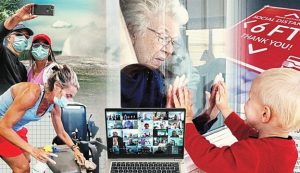 For the past year, our country has been mired in a deep crisis that has dominated much of our energy, attention, and emotions. But we are, by and large, moving past the worst of the pandemic, which makes it a good time to take a deep breath and assess the changes that have occurred.
For the past year, our country has been mired in a deep crisis that has dominated much of our energy, attention, and emotions. But we are, by and large, moving past the worst of the pandemic, which makes it a good time to take a deep breath and assess the changes that have occurred.
Lesson 1: Family Matters More Than We Realized
Spouses and partners are critical to well-being. “The ones who’ve done exceptionally well are couples in long-term relationships who felt renewed intimacy and reconnection to each other,” says social psychologist Richard Slatcher, who runs the Close Relationships Laboratory at the University of Georgia.
Family may be the best medicine of all. “Now we know if you can’t hug your 18-month-old granddaughter in person, you can read to her on FaceTime,” says author Jane Isay. “These coping skills may be the greatest gifts of COVID to an older generation that deeply and rightly fears isolation.”
Lesson 2: Self Care Is Not Self-Indulgence
As the virus upended life last spring, America became hibernation nation. Why care about self-care? Pampering is vital to well-being — for yourself and for those around you. Activities that once felt indulgent became essential to our health and equilibrium, and that self-care mindset is likely to endure. Whether it is permission to take long bubble baths, tinkering in the backyard “she shed,” enjoying herbal tea or seeing noon come while still in your robe, “being good to yourself offers a necessary reprieve from whatever horrors threaten us from out there,” Gillies says.
Lesson 3: Have a Stash Ready for the Next Crisis
Before the pandemic, nearly 4 in 10 households did not have the cash on hand to cover an unexpected $400 expense, according to a Federal Reserve report. Then the economic downturn hit. By last October, 52 percent of workers were reporting reduced hours, lower pay, a layoff or other hits to their employment situation. A third had taken a loan or early withdrawal from a retirement plan or intended to.
Thanks to quarantines and forced frugality, Americans’ savings rate — the average percentage of people’s income left over after taxes and personal spending — skyrocketed last spring, peaking at an unprecedented 33.7 percent.
While no one would be displeased if we could magically erase this whole pandemic experience, it’s been the crucible of our lives for a year, and we have much to learn from it — and even much to gain.
Author: Sean McCabe, for the AARP Bulletin, published March 4, 2021 https://www.aarp.org/health/conditions-treatments/info-2021/lessons-from-covid.html

